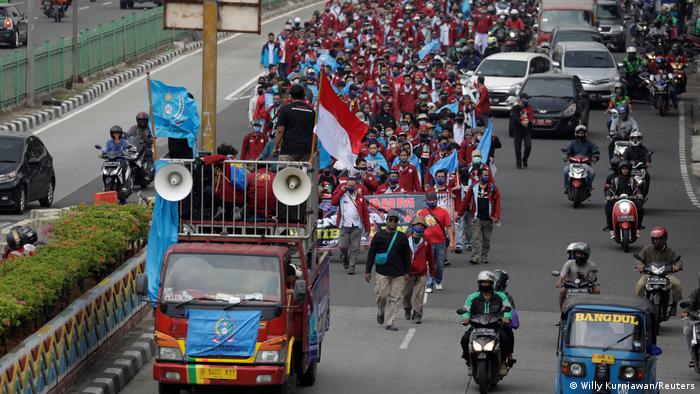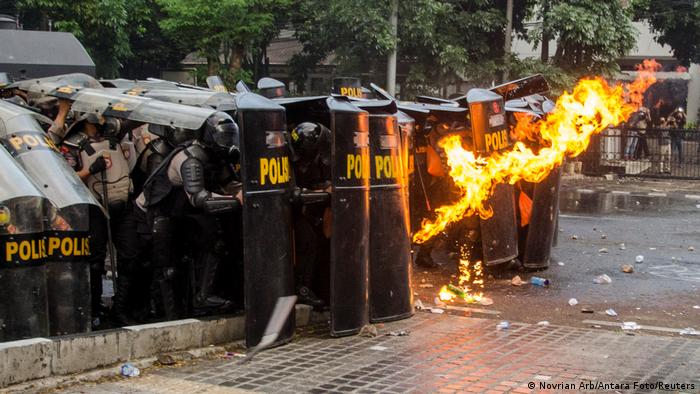Protesters and striking workers have entered the third day of clashes with police against a new reform which they say undermines workers' rights. Thousands have taken to the streets and hundreds have been arrested.

VIDEO https://p.dw.com/p/3jbpt
Thousands of people took part in protests and strikes across Indonesia for a third straight day on Thursday in a call for the government to repeal its controversial "Omnibus" reform, which was enacted on Monday.
At least 600 people have been arrested in clashes with the police. Protesters said the new law undermines job security as well as environmental regulations. The government considers it a necessary step to encourage investment in the faltering economy.
Protesters, many of them students, gathered in major cities across the country on Thursday morning. Police responded to the street demonstrations with tear gas and water cannons. Two students were seriously injured in the confrontations.

Hundreds of protesters push against a wall of police
Police in the capital, Jakarta, prevented protesters from holding mass rallies in front of the parliament building by blocking the city's streets.
Workers and students united against the government
A video shared on Twitter showed protesters in the city of Semarang, on the island of Java, knocking down a gate while facing off against the police.
Workers also went out on strike against the new legislation. Said Iqbal, president of the Confederation of Indonesian Workers' Union (KSPI), which, along with 32 other trade unions, had called for the strike, said Thursday would be the third and final day of strikes.
The "Omnibus" reform made changes to 79 other laws in order to improve bureaucratic efficiency, but protesters claimed that the legislation hurts workers by changing how the labor system regulates severance pay, outsourcing and dealing with wages.
Maulana Syarif, a 45-year-old vehicle production worker, told Reuters news agency he had joined the protest for the sake of future generations. "We ask that the law be repealed immediately," he said.
"This is our struggle for our children and grandchildren and our future generations...If it's like this (with the new law) our well-being will decrease, and we will lack certainty in jobs," he added.
An economy in need of a cure
Indonesia's government under President Joko Widodo introduced the bill in order to increase foreign direct investment in the country as a means of boosting Southeast Asia's largest, but ailing, economy.
The legislation cuts back on red tape and erodes labor and environmental protections in an attempt to appeal to businesses and investors. The reforms have been cautiously welcomed by some financial analysts, but other groups criticized the lack of consultation and expedited passing of the law.
ab/sms (Reuters, AP)
Thousands of Indonesians have taken to the streets this week to protest President Joko Widodo's so-called Omnibus Bill on Job Creation — a new piece of legislation that slashes regulations contained in more than 70 separate existing laws to open up the country to more foreign investment.
With seven of the nine political parties represented in parliament in favor of the 905-page stimulus measure, lawmakers smoothly passed the bill on Monday.
The legislature had initially planned to consider the bill at the end of the week but calls from some 32 labor unions for a three-day national strike starting Tuesday to oppose it prompted the government to speed up the vote.
Labor activists and environmentalists have come together in an unlikely alliance to protest the cut in regulations on businesses which they say would come at a high cost to workers and the environment.
"We are very disappointed and devastated with the House of Representatives and the government for openly displaying a lack of empathy and no ethical sense in the legislative process," Riden Hatam Aziz, secretary general of the Confederation of Indonesian Workers Union, told DW.
"Needless to say this is tremendously embarrassing in a country that is reputedly a democracy," said Aziz.
Human rights group Amnesty International called the legislation "catastrophic" for workers, saying it would damage job security and livelihoods.
Economic despair amid pandemic
The Indonesian government hopes the measure will accelerate reform in the country's economy, make it more business friendly and stimulate investment and job creation.
Indonesia, Southeast Asia's largest economy, has been among the nations hit hardest by the coronavirus pandemic and is facing recession.
With the economy expected to contract this year for the first time since the Asian financial crisis of the late 1990s, Widodo is set on pushing ahead with measures to ensure the country's economic recovery, despite rising COVID-19 infections.
Indonesia has registered at least 307,000 coronavirus cases with more than 11,000 related deaths. Health experts, however, warn many more cases and deaths have gone unreported.
Thousands of people took part in protests and strikes across Indonesia for a third straight day on Thursday in a call for the government to repeal its controversial "Omnibus" reform, which was enacted on Monday.
At least 600 people have been arrested in clashes with the police. Protesters said the new law undermines job security as well as environmental regulations. The government considers it a necessary step to encourage investment in the faltering economy.
Protesters, many of them students, gathered in major cities across the country on Thursday morning. Police responded to the street demonstrations with tear gas and water cannons. Two students were seriously injured in the confrontations.

Hundreds of protesters push against a wall of police
Police in the capital, Jakarta, prevented protesters from holding mass rallies in front of the parliament building by blocking the city's streets.
Workers and students united against the government
A video shared on Twitter showed protesters in the city of Semarang, on the island of Java, knocking down a gate while facing off against the police.
Workers also went out on strike against the new legislation. Said Iqbal, president of the Confederation of Indonesian Workers' Union (KSPI), which, along with 32 other trade unions, had called for the strike, said Thursday would be the third and final day of strikes.
The "Omnibus" reform made changes to 79 other laws in order to improve bureaucratic efficiency, but protesters claimed that the legislation hurts workers by changing how the labor system regulates severance pay, outsourcing and dealing with wages.
Maulana Syarif, a 45-year-old vehicle production worker, told Reuters news agency he had joined the protest for the sake of future generations. "We ask that the law be repealed immediately," he said.
"This is our struggle for our children and grandchildren and our future generations...If it's like this (with the new law) our well-being will decrease, and we will lack certainty in jobs," he added.
An economy in need of a cure
Indonesia's government under President Joko Widodo introduced the bill in order to increase foreign direct investment in the country as a means of boosting Southeast Asia's largest, but ailing, economy.
The legislation cuts back on red tape and erodes labor and environmental protections in an attempt to appeal to businesses and investors. The reforms have been cautiously welcomed by some financial analysts, but other groups criticized the lack of consultation and expedited passing of the law.
ab/sms (Reuters, AP)
What Indonesia's labor reforms mean for workers' rights, the environment
A controversial measure aimed at cutting red tape by amending dozens of laws covering taxation, labor and environment regulations has workers, trade unions and environmental activists form an unlikely alliance.

A molotov cocktail explodes against police shields
A controversial measure aimed at cutting red tape by amending dozens of laws covering taxation, labor and environment regulations has workers, trade unions and environmental activists form an unlikely alliance.

A molotov cocktail explodes against police shields
Thousands of Indonesians have taken to the streets this week to protest President Joko Widodo's so-called Omnibus Bill on Job Creation — a new piece of legislation that slashes regulations contained in more than 70 separate existing laws to open up the country to more foreign investment.
With seven of the nine political parties represented in parliament in favor of the 905-page stimulus measure, lawmakers smoothly passed the bill on Monday.
The legislature had initially planned to consider the bill at the end of the week but calls from some 32 labor unions for a three-day national strike starting Tuesday to oppose it prompted the government to speed up the vote.
Labor activists and environmentalists have come together in an unlikely alliance to protest the cut in regulations on businesses which they say would come at a high cost to workers and the environment.
"We are very disappointed and devastated with the House of Representatives and the government for openly displaying a lack of empathy and no ethical sense in the legislative process," Riden Hatam Aziz, secretary general of the Confederation of Indonesian Workers Union, told DW.
"Needless to say this is tremendously embarrassing in a country that is reputedly a democracy," said Aziz.
Human rights group Amnesty International called the legislation "catastrophic" for workers, saying it would damage job security and livelihoods.
Economic despair amid pandemic
The Indonesian government hopes the measure will accelerate reform in the country's economy, make it more business friendly and stimulate investment and job creation.
Indonesia, Southeast Asia's largest economy, has been among the nations hit hardest by the coronavirus pandemic and is facing recession.
With the economy expected to contract this year for the first time since the Asian financial crisis of the late 1990s, Widodo is set on pushing ahead with measures to ensure the country's economic recovery, despite rising COVID-19 infections.
Indonesia has registered at least 307,000 coronavirus cases with more than 11,000 related deaths. Health experts, however, warn many more cases and deaths have gone unreported.
No comments:
Post a Comment